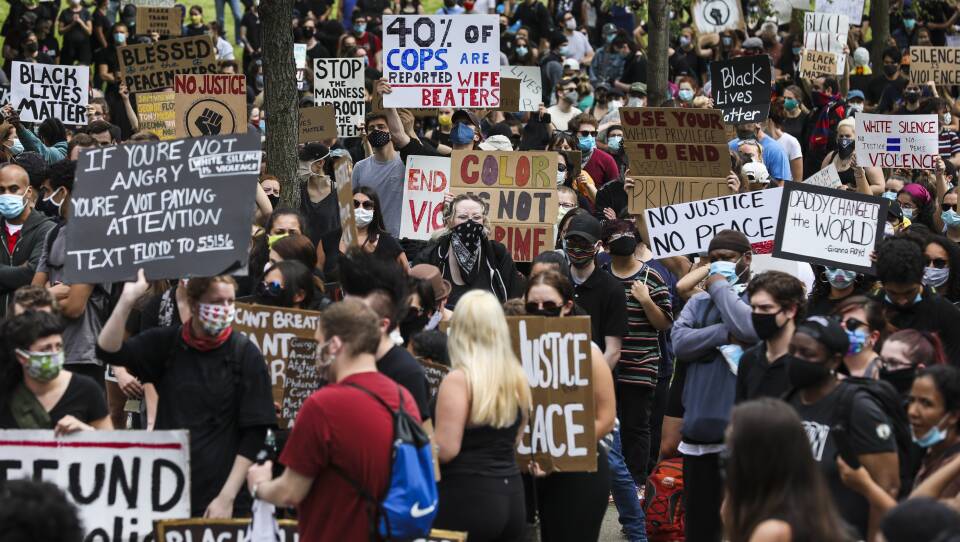On June 1, after hours of peaceful protest turned into rioting and looting in Boston, Mayor Marty Walsh met the press. He praised what he called the “vast majority” of demonstrators, condemned the violent few, and then admitted there is real risk that protesting now will spread COVID-19.
"We believe in free speech," Walsh said. "We believe in people's right to protest ... We were actually giving out masks yesterday to the marchers, to make sure the marchers were protecting [themselves].
"My message is to take care of yourself and be careful," Walsh added. "Because you’ll take that virus in your house and the damage that might have been caused last night [Sunday], you’ll do far greater damage to your own family if elderly people get sick and pass from this."
Two days later, Gov. Charlie Baker struck a similar note, urging people to balance their need to be heard with the ongoing COVID fight. Ultimately, Baker said, the decision is up to them.
"There have been protests over the course of the past several months, none that have gotten the attention or been as large as any of these," Baker said. "But no one at the state or local level has tried to shut anybody down from exercising that First Amendment right."
Of course, as Mass GOP chair Jim Lyons noted on Twitter, we have closed churches and restaurants, and kept visitors out of nursing homes. There's a lot of back and forth about this discrepancey on social media, not all of it edifying. But one tweet stuck with me as I reported this story — from Rhea Boyd, a California physician, who said: “Even during COVID19, protests save lives. I am a doctor. Please quote me saying this.” So I gave her a call.
"It is so critical that people are in the streets right now," Boyd, a pediatrician who also trained at the Harvard School of Public Health, said.
"We have a history in this country of requiring black people to physically be in the streets, before we as a nation are willing to afford them the rights that other groups have had," she added. "Public unrest is what it takes."
While Boyd doesn't dismiss the idea that the protests pose a COVID risk, she argues that too many people citing that risk — and the toll COVID has already taken on African Americans — are doing it in bad faith.
"They’re disingenuously using it to undermine the importance of these protests," Boyd said. "Are black people more likely to die of COVID? Yes. But black Americans have the highest all-cause mortality of nearly every single racial and ethnic group in this country ... The single most effective public action that moves laws in ways that protect lives is protest."
Still, from an epidemiological perspective, packing large numbers of impassioned people together in a pandemic is inherently risky.
"As a woman of color, a black woman, I appreciate that people are out there protesting," said Cassandra Pierre, the associate hospital epidemiologist at Boston Medical Center. "There have been too many cycles of brutality."
But Pierre is also concerned that the physical realities of protest will lead to a COVID spike.
"I really worry about it," she said. "Part of being in a protest is that you’re joining together, you’re banding together. And even though yes, it would be great to limit the number of respiratory droplets that are evoked by using drums, by using tambourines ... This is also, in addition to being a really important political tool, a moment of catharsis and grief. And people are going to give voice to that.
The good news, Pierre says, is that the protests are outside, which should help disperse the droplets that spread the virus.
Even so, she has some advice for participants. Wear surgical masks instead of cloth ones, and goggles too. Stay apart from each other: if six feet of distance isn't possible, even three feet could help reduce the virus's spread. March in small groups with people you know. And consider self-quarantining afterward, especially if taking those other steps proved impossible.
For the record, protest organizers are grappling with these questions as well.
"We made sure we had multiple ways for them to get face masks, hand sanitizer, gloves," said Monica Cannon-Grant, who organized a protest that drew thousands of people to Boston's Franklin Park this past Tuesday. "I continuously said over the microphone, if you can space out space out, but keep your mask on at all times.
Monica Cannon-Grant says she’s trying to keep things as safe as they can be — but adds that, in the wake of George Floyd's death, asking people not to protest is a nonstarter.
"Being concerned about COVID is definitely at the forefront of my mind, and I think it’s at the forefront of a lot of people’s minds," Cannon-Grant said.
"But if you’re a black person in this country, the other thing you’re thinking about is that the fact that the very people charged with protecting and serving us are killing us. We’re not going to solve this issue by staying in the house. Someone has to take the initiative to say, enough is enough."





